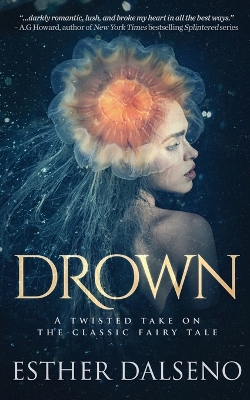
Jo
Written on Apr 8, 2016
Normally I give my own summary of the books I review, but Drown stays so close to the original Hans Christian Anderson story, I don't think it's necessary, especially with the description from Goodreads above. Drown feels like a love letter from Dalseno to the great Hans Christian Anderson, so well and respectfully does it stick to the original story. These days, retellings tend to take a fairy tale, keep all the significant and important elements, and change everything else so it's almost unrecognisable and completely original. This isn't a bad thing, I have completely loved pretty much all the fairy tale retellings I've read, and you're always left guessing as to what would happen because it's so unlike the original. However, with Drown, Dalseno has pretty much taken the whole of the original story, and lovingly moulded and shaped it, expanding it to a full-length novel. Drown is the story we know, but there's more backstory and world building. We learn about how the merfolk came to be, why the witch is so cruel and evil, and so much more. So beautifully crafted is this story, it's impossible not to feel how much Dalseno loves the original story, and so as I was reading, I felt Dalseno understood me. "She gets it!" I would think, and would feel such a rush of affection for the author who not only shared my love for this story, but also used that love to write such an achingly gorgeous retelling.
Enough of my gushing, and more about the story. As I mentioned, Dalseno gives The Little Mermaid world building that the original doesn't have. Merfolk have very little humanity, and because of this, they are all but emotionless. More animal than human, their faces always remain expressionless. They have no interest in anything other than eating, buying trinkets and ornaments, and looking at themselves and their beauty in the mirror. They are unintelligent and shallow, and do not like questions. The Little Mermaid is different. She's inquisitive, so full of questions she annoys her older sisters and her nanny, and knows that her facial movements tend to scare those around her. So she limits her facial expressions, and learns not to outwardly express her joy or excitement. There's a reason she's different, which becomes apparent as you read on.
What's especially wonderful about Drown is that although it would have been a fantasy story anyway, it's a magic realism story. It has the trademark wonderful, lyrical writing, and has the ordinary become something extraordinary, like a crying lighthouse - you will see. I always find magic realism to be completely enchanting, and Drown is no different. The thing with magic realism is it can take something dark and make it seem at the very least something that you accept, if not something that seems beautiful. The currency of the merfolk world is beauty. Not beautiful things, but your own beauty. The more beautiful you are, the more you can buy - food for example - but the thing with beauty being the currency is that the more you buy, the more you become unattractive. Because to give beauty, it must be cut off. Hair, for example, or maybe a finger or a limb. The merfolk need to butcher themselves in order to survive. Let that sink in. It's horrific, but it's written in such a way that you barely even register it as being as shocking as it is. But merfolk put a lot of status on beauty, too, so if you're ugly, not only are you poor, you're also shunned. The disabled are treated as repulsive, frightening, and not worthy of anyone's time. They are left to starve, because prices go up to prevent them from buying, as their custom isn't wanted. Although extreme, if you think about it, it's not too different to how our society treats disabled people; ignored, left out, or without access to what non-disabled people take for granted.
Disability is not the only thing Dalseno subtly comments on. She also looks into depression and self-harming. The Prince (who is also a person of colour, though his race/ethnicity isn't given) isn't happy with his life. He doesn't want to be a Prince, to become a King, to rule, but he can see no-way of escaping. He tries to relieve his pain by cutting into his skin, and so his body is a lattice of criss-cross scars. We actually see the Prince self-harm, and you're almost numb to it. It's written to shock without seeming shocking. Do not misunderstand; Dalseno isn't romanticising self-harm, she's shining a light on it and making the reader aware through the style of writing.
Drown is beautiful and enchanting, dark and tragic. It's the The Little Mermaid retelling I have been waiting all this time for, and I can't thank Dalseno enough for writing it.
